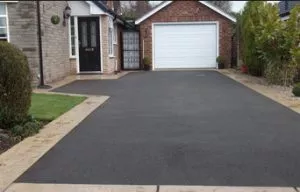
If you’re thinking about resurfacing your driveway, you might be wondering just how to choose the right surface material for your home. Well, you’ve come to the right place. We’ve listed the pros and cons of the main driveway surface types to help make your decision easier.
Whatever the motives behind your choice, you’re bound to find the right driveway surface for you.
When faced with a difficult decision, we like to make lists of pros and cons. To help you do so, why not start by prioritizing the elements that are most important to you:
- Appearance of the surface material: Are you looking for something to increase your curb appeal and fit in with the overall look of your home?
- Climate: What kind of temperature fluctuations and what levels of snow and rain will the surface be subject to?
- Upkeep: How much time can you (and do you want to) invest in maintaining your driveway?
- Budget: Your budget is most likely priority numero uno, you need to find the best compromise between quality and investment.
Gravel
PROS:
- What is my budget? How can I remain in the budget but get the looks I want?
- What about maintenance? How much time can I, realistically, dedicate to the driveway’s upkeep?
- Will the local weather play a part in the decision? Which options are best for the typical seasonal conditions?
- What does it have to look like? Do I want it to match the architectural design or can I go a bit different?
CONS:
- Requires the most upkeep: need to add several layers of gravel as it becomes compacted, may need to add more gravel in spring if the snow plough has dispersed it from your driveway
Gravel might not be the most attractive option, but you can improve its look by adding a layer of decorative gravel on top (about 50mm‑thick).
Using natural stone is a great alternative to gravel that is still relatively economical and good for the environment. We like limestone, pebbles and slate. Unlike gravel, you won’t have to spend too much time picking pieces out of the grass in the spring.
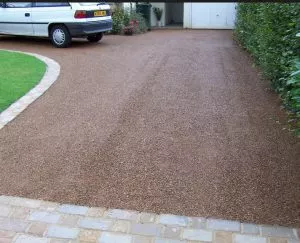
Asphalt
PROS:
- Popular solution, won’t stick out like a sore thumb in your neighbourhood
- Low maintenance: you must apply a sealer every few years to protect it for the elements
CONS:
- None
You need to properly prepare the ground before resurfacing your driveway. If you fail to do so, you may have unsatisfactory results.
If you feel like asphalt is a little too boring, why not ask to have a pattern stamped into it, you can easily make it look like paving!

Concrete paving blocks
PROS:
- Resistant to heavy vehicles and temperature fluctuations
- Can last up to 30 years
- Available in various colours, shapes and textures
- Low maintenance: you must apply a sealer every year to protect it from the elements
CONS:
- Expensive
As we mentioned above with asphalt, preparing the ground before having the concrete pavers laid is of the utmost importance.
An interesting alternative to concrete pavers is poured concrete, which is poured into compartments with joints that leave enough space for the concrete to expand and contract as the temperature changes.
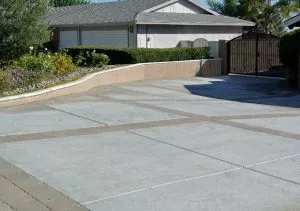
Unistone
PROS:
- Very attractive: instantly improves the curb appeal of your home
- Low maintenance: you must apply a sealer every year to protect it from the elements
- Can easily change out a block without disturbing the others if one gets damaged
CONS:
- Expensive
Unistone driveways are made up of blocks (about 60mm‑thick) that are fitted together and set in place with a cement-sand-aggregate mixture.
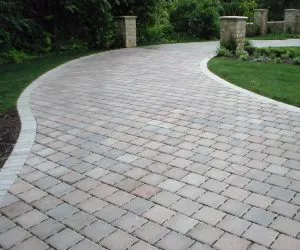
Reinforced grass
PROS:
- Very green friendly
CONS:
- Not very durable: not for frequent use nor for use with heavy vehicles
Most people don’t think of having grass installed for their driveways, and it’s not really surprising. However, it does work for some people. Underneath the grass there is a honeycomb-like plastic structure that has been filled with soil and grass seeds. You might be tempted to speed the process along by laying sod, but if you do so you have to ensure the grass can take root before you use it.
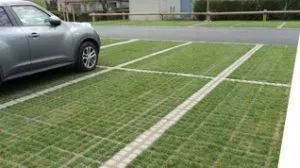
A more useful alternative might be to have concrete slabs or blocks installed with openings where grass can be grown, this is still a relatively green option, and is much more durable.
A combination of different materials
PROS:
- The best of both worlds
CONS:
- Could be time consuming and expensive
If you can’t make up your mind you might consider mixing different surface materials. You could have an asphalt or concrete driveway with grass sections. Or a paved driveway with gravel sections, the choices are simply endless.
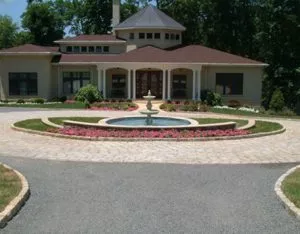
If you are updating your home’s exterior, don’t leave your garage door out!
A tired looking garage door will reverse all the hard work you’ve put into your new driveway in a split second. While you’re sprucing up your driveway, get in touch with us about your garage door at 724-834-8450 and we’ll send you over a detailed quote. If you would like to speak to someone in person, we’ll send someone out to you! With many years in the industry, you’ve come to the right place for all your garage door needs.
If you’re looking for inspiration, head to our image gallery to see a range of available garage door models, if you’ve already got something in mind, try out our Design Centre tool and see how well your new garage door will fit in with your home.


Add new comment